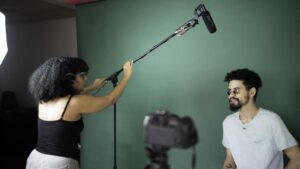On a Thursday evening in October, Leomary Rodriguez is taking her nightly break from social media in her Highbridge apartment-studio. Five rows of different-colored paper rolls line the wall behind her. The silhouette of her thick curly hair–once profiled in the beauty blog Black Girl with Long Hair–breaks up the straight-line aesthetics.
Elsewhere in the apartment lie two plaques from her recent wins at the Bronx 48 hour Film Challenge: Best Sound and Best Directing for her short thriller, “Night Call.” The film short follows a woman whose COVID-era tinder date with an old high-school admirer, now a police officer, ends in calamity.
It has been a 15-year journey of documentary exploration for Rodriguez, who joined her high school film club as a freshman at the Bronx School of Law and Finance. A decade after interning at BronxNet, which followed a string of odd jobs like dog-walking to pay for her media passion projects, she finally got her wish for a full-time role where she could communicate with other filmmakers.
Her father, a former taxi driver, once told her a story that influenced her commitment to film–the first time he, as a young boy, saw a car in the Dominican countryside and vowed to drive. When he finally got to drive, he pledged to do that for the rest of his life.
“He said, ‘look at me now, doing this forever,’ and he doesn’t enjoy it. ‘Whatever you pick, you better enjoy it.’ ”
She knew she would. Her documentary debut as a high school sophomore, “The Key,” a film about local alternatives to detention, opened her eyes to unfair practices happening in her community. Rodriguez gleaned the power of documentaries to communicate social justice issues as well as her resistance as a woman of color creating beauty. She co-produced the doc under the guidance of DreamYard Project, a Morrisania-based nonprofit community arts organization.
The sense of camaraderie in both this program and the self-taught film club, the reliance on peers as much as YouTube tutorials, is something Rodriguez values in her network of media artists.
She tapped into that network when assembling the filmmaking team for “Night Call.” From working with her brother and friend-colleagues like protagonist Sonyi Lopez to connecting with just a few audio producers through social media, Rodriguez stayed mostly close to home to create a COVID bubble while the team took safety precautions.
Mariel Mejia, a fellow Bronxite whose natural hair business Rodriguez features in her new film short series “Directed by You,” describes the filmmaker’s work style as collaborative. Years ago, Rodriguez connected with Mejia after a dog-walking job orientation and taught Mejia photography tricks: using a white background to make a product look bigger, creating shadows for more professional shots.
Crystal Cox, Business Insider’s Creative Director who interned for Rodriguez in 2013, once asked her mentor why she went out of her way to share insights with her hires.
“She told me, ‘because you learn when you teach’,” said Cox. “I thought that said a lot about her character.”
But what Rodriguez most taught co-workers was how to raise the bar for authenticity and pick up new skills. “Every time I talk to Leo, she’s studying something new,” said Mejia, “and she’ll share it with me too.”
In highlighting her Bronxite background to explain what she’s doing and why, Rodriguez also inadvertently gave Mejia lessons in genuineness.

Photo: Giovanni Guerra @thebronxhipster. Leomary Rodriguez adjusts audio for her Directed By You interview with floral designer Christian Montero.
This pride in her Bronxness was why “Sisterin’ in Procession” activist-artist Francheska Alcantara approached Rodriguez in 2017 to collaborate on a performance piece protesting rezoning in the Bronx.
“The specific vibes of her work were very humanizing of people who live in and call The Bronx their home, without imposing others’ expectations of local people’s narratives,” said Alcantara.
During COVID, Rodriguez has continued to shed light on other creatives like Mejia and a local flower-bombing entrepreneur. It’s a great time for documentaries, according to Rodriguez, who encourages video producers to think creatively about using the outdoors to capture the stillness of a place. She also values maximizing time in the COVID era for independent exploration, and drops tips on how to do so.
First, content creators should capitalize on practice time outside of projects.
“It might sound cliché,” said Rodriguez, “but if you have a camera on your phone, that’s all you need.”
Second, video producers should harness remote connections to immerse themselves in the community with which they want to collaborate. They should do something Rodriguez failed to do when she was starting out in her film career: look for mentors in people who work in the role you aspire. If they can’t help you out, they can refer you elsewhere.
Third, strike a balance between overconfidence and under-valuing yourself. When Rodriguez graduated with a media production degree from the University of Buffalo, she handled rejection after rejection by shooting for free to further build her portfolio.
She also cautions that thinking you’re the best can rob you of the opportunity to keep learning.
“To me, [filmmaking] is a diamond, because there are so many aspects to it,” said Rodriguez. “I know I’ll always have something to look forward to and learn, and I won’t learn it all in one lifetime. This is going to be a fun ride. It has been so far.”

